“Am I a person or a weapon?” Borne asks Rachel, in extremis. “You are a person,” Rachel tells him.
“But like a person, you can be a weapon, too.”
— Jeff VanderMeer, Borne
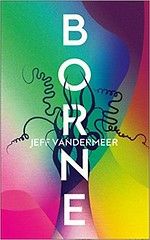 Borne
Borne
by Jeff VanderMeer
![]()
The “Southern Reach” trilogy sold me on Jeff VanderMeer. I’ll probably read anything he writes and I’m not sorry I read “Borne,” but I must warn you this book is a descent into hell, a demented nightmare of crawling, bleeding and wounded, through suffocating tunnels, ravening creatures with toxic claws in pursuit, food and water a fading memory, every object, every living thing, out to kill and eat you. The diseased and ragged third-world orphans who pick through mountains of rubbish to find things to eat and barter? They’ve got it knocked compared to the inhabitants of VanderMeer’s City, who dare not poke their heads aboveground lest Mord swoop down upon them.
I could follow the history of VanderMeer’s dystopia to a point. Rachel remembers a childhood on the run from rising water, ecological disaster, and war; then there’s a blank and here we are in the seventh circle of hell, civilization gone, no hope anywhere, the end of humanity looming, and how did we get to this point? Because of the Company? Because there’s a giant flying bear? I like a little more world-building in my dystopias, frankly.
I never understood why Rachel is called The Scavenger. In the ruined City, who isn’t? Mord the bioengineered bear is faintly ludicrous; Borne, whatever he/she/it is, seems a more likely horror of bioengineering. The title character is perversely relatable, the novel’s most engaging character. VanderMeer fleshes out Wick and Rachel toward the end of the novel but I don’t think it contributed much to the story. He offers Wick and Rachel a small respite from the terrors of the City at the end, but the overwhelming sense of humanity dying in the ruins of a dead city on a ravaged and poisoned planet is not that easily dispelled.
A downer, for all that it is brilliantly written.
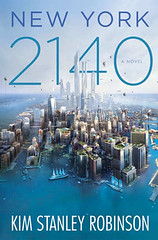 New York 2140
New York 2140
by Kim Stanley Robinson
![]()
I love the first half of “New York 2140.” It has everything going for it: a great SF premise (ways humanity might respond to global warming and sea level rise), engaging characters from different walks of life, fascinating historical Big Apple trivia, kidnappings, sabotage, treasure hunts, high finance, a budding affair or two … and then in the second half, so much more of the same it begins to wear, and you find yourself skipping over paragraphs, particularly the ones written by the unnamed and intrusive “citizen,” lecturing on ecology and finance and systems of government.
The various crises and subplots, all related, lead to upheaval and revolution. KSR has a justified hatred for the way the US government mishandled the financial crash of 2008, where the bankers won and the rest of us lost our shirts. In KSR’s 2140, NYC teeters on the edge of a similar crash, one that will topple international markets in its wake. The six or seven main characters function as triggers for the crash, helped by a fortuitous hurricane; the same cast of characters also prepare the roadmap for a post-crash revolution, this time one that will result in a win for the people, not the bankers.
By the way, it’s astounding how much city dwellers of 2140 know about what happened in 2008, way the hell more than anybody now living knows about the Civil War or even the Civil Rights movement of the 1960s, but hey.
The first half of this novel is so good it should carry you, as it did me, through the excesses of the second half, and yes, I’m talking about buried chests of gold and polar bears on the bridge of a blimp. I had fun reading “2140,” and I liked most of KSR’s pie-in-the-sky revolutionary ideas, though I wish he hadn’t gone on quite so long about them.
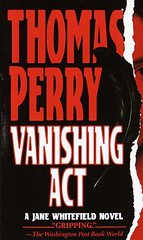 Vanishing Act (Jane Whitefield #1)
Vanishing Act (Jane Whitefield #1)
by Thomas Perry
![]()
I was burning out on Lee Child thrillers and a friend recommended Thomas Perry. I looked at the average reader ratings of Perry novels on Goodreads and was encouraged to see they were all four-star-plus. I picked “Vanishing Act” because it has a female protagonist and is the first in a series featuring that character.
I’m not disappointed, but I’m not wildly enthusiastic either. I feel the need to talk about the novel’s ending, so you can skip this review if you’re one of those who won’t read a book if you know what happens.
Jane Whitefield is a native American who lives her heritage. She’s an accomplished scout and tracker, well versed in skills learned from her father and tribal elders. She uses these skills to help clients assume new identities and hide from their pursuers. At the end of this novel, she calls upon Seneca lore and woodland skills to track, Hiawatha-like, a bad man through the forests of upstate New York, paddling a canoe when she can and portaging it along deer runs when she can’t. She eventually polishes off her prey with a hand-made arrow through the throat and a bop on the noggin with an improvised stone war club. I was a little disappointed she didn’t scalp him as well.
Yes, conjuring up a native American character who solves crimes and rights wrongs with ancient skills is contrived, but I didn’t mind that so much as all the explication. You see, Jane figures out complex mysteries in her head, and there’s actually not a whole hell of a lot of action apart from two brief scenes at the beginning and the chase through the woods at the end. Mostly she chews over events in her mind, figuring out what must have happened to cause A to lead to B, etc, and that’s how the plot unfolds, page after page of meticulous explanation.
I had to make an effort to plow through all that, the entire middle section of this novel, but I’m glad I did, because although I enjoy poking fun at the climactic canoe chase, I quite enjoyed the final chapters. The chase was tense and gripping, though I didn’t doubt for a minute Jane would get her man.*
Honestly, though, I’m not going to commit to reading another Jane Whitefield novel. I may try one of Perry’s other novels, “The Butcher’s Boy” or “Metzger’s Dog.”
*Seriously, those of you so fast to raise the alarm over “spoilers,” isn’t the fact there’s an entire series of Jane Whitefield novels kind of a spoiler in itself?
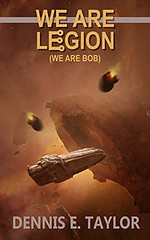 We Are Legion (We Are Bob) (Bobiverse #1)
We Are Legion (We Are Bob) (Bobiverse #1)
by Dennis E. Taylor
![]()
Too easy. Too easy to revive a cryogenically-preserved brain and turn it into code; too easy to transform a personality into a ship-borne artificial intelligence; too easy to scoop molecules from space and fashion them into minerals; too easy to replicate infinite numbers of immortal Bobs; too easy to 3D print anything one’s heart desires; too easy to fashion virtual reality human bodies to live in so that one can enjoy the five senses (and if so why not build an Eve or two?); too easy to terraform worlds; too easy across the board.
Add plenty of geek culture references to TV shows, movies, and manga trivia, keep the characters flat, and you get Science Fiction Lite. “We Are Legion” reads like a TV screenplay; sadly, not as good as SyFy’s “The Expanse,” not even as good as USA Network’s “Colony.”
Pluses: a stab or two at space opera, a sweeping vision, and toward the end a scary encounter with an advanced intelligence that paves the way for a sequel.
I couldn’t help noticing all the rave reviews on Goodreads. Nevertheless, I think serious science fiction devotees, those with an appreciation for science and a grounding in the classics, will be slightly disappointed.
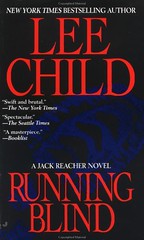 Running Blind (Jack Reacher #4)
Running Blind (Jack Reacher #4)
by Lee Child
![]()
I’m reading Lee Child’s Jack Reacher novels in order. Up to now they’ve been reasonably well-plotted page-turners. This one, while still a page-turner, was not so well plotted, and was a disappointment overall.
My main objections come near the end with the introduction of a suspicious character who, it turns out, has nothing to do with the story. Lee Child, in his earlier Jack Reacher novels, never introduced so much as a stray dog’s hair that wasn’t critical to the plot, let alone an entire character. When you fail Chekov’s gun test, it really stands out.
Another annoyance, more noticeable in this novel than in the previous three, is Reacher’s long-winded explanations of how he’s figured out parts of the mystery. These are related in conversations with his FBI sidekick, always after some new plot twist. I thought I remembered more showing and less telling in the previous books, but I may be wrong. Reacher, the normally taciturn man of action, becomes a blabbermouth whenever Child is too lazy to weave explanations into the action. I said in my review of the first Jack Reacher novel that Child is a hack but an entertaining one. In this book, his hackishness is more pronounced.
Also, too, I figured out who the murderer is very early on. That hasn’t happened before, either. I hope Jack Reacher recovers from this career setback.
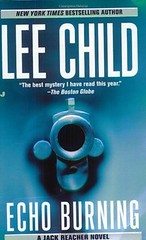 Echo Burning (Jack Reacher #5)
Echo Burning (Jack Reacher #5)
by Lee Child
![]()
Ack, this one’s worse than the fourth Jack Reacher novel. I love the idea of the Jack Reacher character, but I’m coming to hate the cheesy tricks Lee Child uses to unravel the villains’ nefarious schemes. In this one, for example, Reacher magically figures out that a missing attorney must have been waylaid and killed by professional assassins, then moved “more than one mile but less than two” from his abandoned Mercedes. Not only that, Reacher somehow knows to tell the searchers to look for the body on the left side of the road. Shortly afterward, he works out that the assassination team is made up of three persons. How? Because that’s how he did assassinations when he was a military policeman.
I always wondered what Army MPs were doing when they weren’t busting black marketers or rousting out homosexuals. They were assassinating people! Folks, this is just bullshit. Jack Reacher is bullshit. He doesn’t have to be, but Lee Child … at least in the fourth and fifth Jack Reacher novels … has made him that way. And I hate it.
Equally disappointing, the fourth and fifth novels end in classic “closed room” mystery fashion, with Jack Reacher making a speech, telling the bad guys how he cracked their plot. And then the power goes out. And in the darkness, a shot! I was excited about the Jack Reacher novels at first, but now I worry that if I re-read the first three novels, they’d be about the same.
I’m taking an extended Jack Reacher break. Number four wore me down. Number five broke me.
Did Not Finish
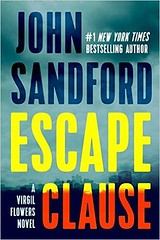 Escape Clause (Virgil Flowers #9)
Escape Clause (Virgil Flowers #9)
by John Sandford
![]()
I picked this off the “new books” shelf at the local library. It wasn’t what I was looking for, but I decided to give it a try. The characters didn’t engage me and the writing seemed tailored to an audience with basic reading skills. The author does a weird thing by including detailed descriptions of snacks and fast food meals eaten by Virgil Flowers as he drives between crime scenes. If that’s meant to be a hook, it doesn’t hook me. As soon as the library notified me the book I wanted was in, I abandoned this one.